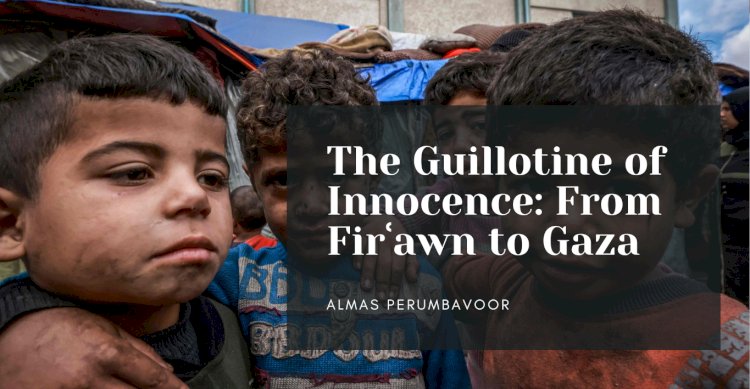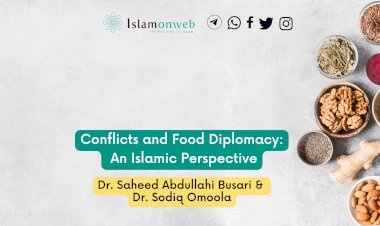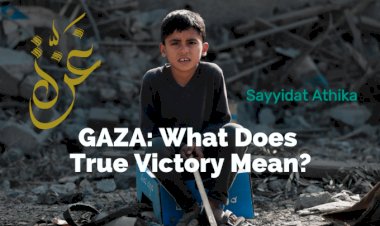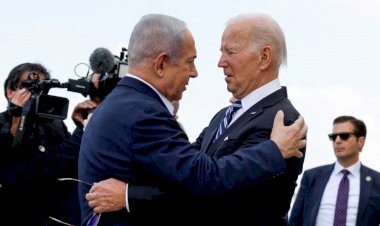The Guillotine of Innocence: From Firʿawn to Gaza
As of 2024, there are approximately 2.4 billion children in the world, accounting for about 25% of the global population. Yet, many of these children endure immense suffering, whether as orphans or because their parents’ wages are insufficient to support their families’ progress. But are children meant to suffer? Why do we need children? This article delves into the profound significance of children and explores Islamic teachings on how they should be treated. Though I am not an expert scholar, as a child myself, let me take a shot at shedding some light on this topic.
"Cherish your children... for they are the footprints you will leave behind."
— Taylor Evan Fulks
Children are the most vulnerable members of our society, deserving of protection, care, and nurturing. Their well-being is not only a moral obligation but also essential for the sustenance and progress of any community or nation.
Children embody the future of humanity. They are the inheritors of the world we leave behind, shaping its trajectory with their ideas, talents, and values. Investing in their health, education, and protection is, therefore not just an act of compassion but a matter of strategic importance. Healthy, educated, and empowered children are more likely to grow into productive members of society, driving economic growth, fostering social cohesion, and promoting sustainable development.
Only by prioritising children today can we build a better future for all, ensuring every child has the opportunity to thrive, grow, and fulfil their potential. Organisations such as the World Health Organization (WHO), the International Federation of Red Cross and Red Crescent Societies (IFRC), and Save the Children are deeply engaged in efforts to address the challenges faced by children. Despite their tireless work, these plights persist, underscoring the urgent need for more effective measures to ensure children’s safety and well-being.
Despite these efforts, the challenges persist, particularly due to political tensions and ongoing armed conflicts. Children remain highly vulnerable to physical harm, psychological trauma, and exploitation. The impact of these adversities extends beyond individual children, affecting entire communities and shaping future generations.
These attacks violate international humanitarian law and fundamental human rights principles, endangering the lives and well-being of innocent children. Many are killed or injured in airstrikes, shelling, or ground incursions, with devastating consequences for their families and communities. The absence of adequate protection mechanisms only worsens their plight, exposing them to numerous risks and undermining their safety and dignity.
Challenges such as political instability, resource constraints, and ineffective governance further hinder efforts to safeguard children’s rights and well-being. In conflict zones, ongoing violence and blockades exacerbate humanitarian crises, making it nearly impossible for aid agencies to deliver essential services and support to affected populations, including children.
The Divine Love
Islam has always given great importance to children in the formation of a society. With its far-reaching insight, Islam recognises that children are a divine key to unlocking the mysterious paths to the world beyond their intellectual understanding. As we know, the last Prophet descended into this world filled with trauma and agony—Prophet Muḥammad ﷺ, the perfect example for humanity, as stated in the Holy Qur’an:
لَّقَدْ كَانَ لَكُمْ فِى رَسُولِ ٱللَّهِ أُسْوَةٌ حَسَنَةٌۭ لِّمَن كَانَ يَرْجُوا۟ ٱللَّهَ وَٱلْيَوْمَ ٱلْـَٔاخِرَ وَذَكَرَ ٱللَّهَ كَثِيرً
"Indeed, in the Messenger of Allah, you have an excellent example for whoever has hope in Allah and the Last Day and remembers Allah often" (Qur’an 33:21).
The Prophet ﷺ consistently showed us the path to the divine world, Jannah. His words, actions, and life are a profound message for humanity. He commanded us to treat children with respect and mercy, to protect them, and to provide for their basic needs, including education, shelter, and sustenance. Most importantly, he urged us to train them to become future pioneers of the world. This is reflected in the Prophetic ḥadīth:
حَدَّثَنَا عَبْدُ الْعَزِيزِ بْنُ عَبْدِ اللهِ، حَدَّثَنِي ابْنُ أَبِي الزِّنَادِ، عَنْ عَبْدِ الرَّحْمَنِ بْنِ الْحَارِثِ، عَنْ عَمْرِو بْنِ شُعَيْبٍ، عَنْ أَبِيهِ، عَنْ جَدِّهِ، أَنَّ رَسُولَ اللهِ صلى الله عليه وسلم قَالَ: لَيْسَ مِنَّا مَنْ لَمْ يَرْحَمْ صَغِيرَنَا، وَيَعْرِفْ حَقَّ كَبِيرِنَا.
"ʿAmr ibn Shuʿayb reported from his grandfather that the Messenger of Allah ﷺ said: 'Anyone who does not show mercy to our children nor acknowledge the rights of our elders is not one of us.'"
Additionally, the Prophet ﷺ demonstrated, through many incidents, the importance of taking care of children and expressing love toward them. One such instance was reported by Yaʿlā ibn Murrah:
حَدَّثَنَا عَبْدُ اللهِ بْنُ صَالِحٍ، قَالَ: حَدَّثَنَا مُعَاوِيَةُ بْنُ صَالِحٍ، عَنْ رَاشِدِ بْنِ سَعْدٍ، عَنْ يَعْلَى بْنِ مُرَّةَ أَنَّهُ قَالَ: خَرَجْنَا مَعَ النَّبِيِّ صلى الله عليه وسلم، وَدُعِينَا إِلَى طَعَامٍ فَإِذَا حُسَيْنٌ يَلْعَبُ فِي الطَّرِيقِ، فَأَسْرَعَ النَّبِيُّ صلى الله عليه وسلم أَمَامَ الْقَوْمِ، ثُمَّ بَسَطَ يَدَيْهِ، فَجَعَلَ يَمُرُّ مَرَّةً هَا هُنَا وَمَرَّةً هَا هُنَا، يُضَاحِكُهُ حَتَّى أَخَذَهُ، فَجَعَلَ إِحْدَى يَدَيْهِ فِي ذَقْنِهِ وَالأُخْرَى فِي رَأْسِهِ، ثُمَّ اعْتَنَقَهُ فَقَبَّلَهُ، ثُمَّ قَالَ النَّبِيُّ صلى الله عليه وسلم: حُسَيْنٌ مِنِّي وَأَنَا مِنْهُ، أَحَبَّ اللَّهُ مَنْ أَحَبَّ الْحَسَنَ وَالْحُسَيْنَ، سَبِطَانِ مِنَ الأَسْبَاطِ.
"Yaʿlā ibn Murrah said: 'We went out with the Prophet ﷺ, and we were invited to eat. Ḥusayn was playing on the road, and the Prophet ﷺ raced ahead of the group and spread out his arms. The boy began running this way and that, and the Prophet ﷺ made him laugh until he caught hold of him. The Prophet ﷺ placed one hand under his chin and the other on his head, then embraced him and kissed him. Then the Prophet ﷺ said: ‘Ḥusayn is from me, and I am from Ḥusayn. Allah loves those who love al-Ḥasan and al-Ḥusayn. They are two of my distinguished descendants.’”
The Prophet ﷺ also did not compel children or women to participate in wars. Perhaps this was because he recognised the critical role of children in preserving the continuity of Muslim generations. This wisdom is reflected in the Qur’anic verse:
وَلَا تَقْتُلُوٓا۟ أَوْلَـٰدَكُمْ خَشْيَةَ إِمْلَـٰقٍۢ ۖ نَّحْنُ نَرْزُقُهُمْ وَإِيَّاكُمْ ۚ إِنَّ قَتْلَهُمْ كَانَ خِطْـًۭٔا كَبِيرًۭا
"Do not kill your children for fear of poverty. We provide for them and for you. Surely, killing them is a heinous sin" (Qur’an 17:31).
The Historic Link
In the annals of history, Pharaoh Firʿawn's ruthlessness stands as a chilling testament to the depths of human cruelty. His decree to slaughter children, born from fear and insecurity, echoes not merely as a grim footnote in the chronicles of ancient Egypt but as a stark reminder of the moral imperative to safeguard innocence. This is reflected in the Qur’anic verse:
إِنَّ فِرْعَوْنَ عَلَا فِى ٱلْأَرْضِ وَجَعَلَ أَهْلَهَا شِيَعًۭا يَسْتَضْعِفُ طَآئِفَةًۭ مِّنْهُمْ يُذَبِّحُ أَبْنَآءَهُمْ وَيَسْتَحْىِۦ نِسَآءَهُمْ ۚ إِنَّهُۥ كَانَ مِنَ ٱلْمُفْسِدِينَ
"Indeed, Pharaoh exalted himself in the land and made its people into factions, oppressing a sector among them, slaughtering their [newborn] sons and keeping their females alive. Indeed, he was one of the corrupters" (Qur’an 28:4).
In the heart of every child resides a spark of hope, an embodiment of the future yet to unfold. Children are the custodians of dreams and the architects of tomorrow's world. To extinguish their light is to consign humanity to a darkness from which it may never emerge.
In Firʿawn's relentless pursuit of power and control, he sought to crush that which he could not comprehend—the purity of youth, the resilience of innocence, and the boundless potential of children. Yet, through his barbarity, he unwittingly illuminated the intrinsic value of children in the fabric of society.
It is in their laughter that we find solace, in their curiosity, that we glimpse the limitless potential of humanity. Children are the harbingers of compassion, the champions of empathy, and the embodiment of unbridled hope.
The tragedy of Firʿawn's tyranny compels us to confront our collective responsibility to nurture, protect, and cherish children. For in their tender hearts lies the promise of a world redeemed, where the sins of the past are vanquished by the virtues of tomorrow.
Yet today, we find ourselves grappling with atrocities that mirror the brutality of Firʿawn. In Gaza, over 16,800 children have been killed since October 2023, their laughter silenced and their futures stolen. More than 17,000 children have been orphaned, left to navigate a world of unimaginable loss, and thousands more are displaced, separated from their families, and exposed to profound psychological trauma.
The conflict in Gaza underscores the urgency of our collective duty to protect children. Just as Firʿawn's oppression highlighted the value of children, today’s tragedies force us to recognise the devastating cost of failing to safeguard their lives and rights.
Children embody hope, resilience, and potential, but these qualities are extinguished when they become victims of violence, exploitation, or neglect. As a society, we must rise to the occasion, ensuring that no child’s light is dimmed by the darkness of war, displacement, or deprivation. Only by learning from the past and addressing the injustices of the present can we secure a future where every child is free to laugh, learn, and lead.
The Day for Children and Children in Gaza
The world has long dedicated a day (November 20) to children, serving as a poignant reminder of their resilience, courage, and inherent worth despite the harsh realities many endure. While it acknowledges the hardships faced by countless children, Children's Day also emphasises the importance of nurturing hope, fostering solidarity, and reaffirming our collective responsibility to protect and empower children everywhere.
On this day, communities, governments, and organisations come together to advocate for children’s rights, raise awareness about their needs and aspirations, and mobilise support for initiatives that promote their well-being. However, even as we witness the celebrations, I can’t help but question: is celebrating Children’s Day truly appropriate when so many children around the world continue to suffer? While some revel in the joy of sweets and festivities, others endure pain, clinging to hope while battling the solitude that gnaws at their hearts. Is this disparity fair?
The plight of children in conflict zones, such as Gaza, underscores the urgent need for concerted global action to protect their rights and well-being. Governments, humanitarian organisations, and the international community must prioritise children’s issues, allocate resources effectively, and implement comprehensive strategies to address the root causes of violence and insecurity.
As of November 20, 2024, the ongoing conflict in Gaza has had a devastating impact on children. Reports indicate that over 16,800 Palestinian children have been killed since October 7, 2023, marking the highest number of child fatalities in a single year of conflict over the past two decades.
In addition to the tragic loss of life, more than 17,000 children have lost one or both parents, and approximately 21,000 are reported missing. The United Nations Children's Fund (UNICEF) estimates that at least 17,000 children in Gaza are unaccompanied or separated from their families, each representing a heartbreaking story of loss and grief.
The conflict has also led to the displacement of nearly 1.9 million people in Gaza, with children comprising about half of this number. These displaced children face severe shortages of water, food, fuel, and medicine, and many have lost their homes and loved ones.
The psychological toll on Gaza's children is intensive, with widespread exposure to traumatic experiences that will have long-lasting consequences. The international community continues to call for urgent measures to protect these vulnerable children and address their immediate and long-term needs.
Only by investing in children today can we ensure a better future for all—one where every child has the opportunity to thrive, grow, and fulfil their potential.
About the author
Almas Perumbavoor is a dedicated student at Al-Hidaya Islamic Academy, passionate about exploring Islamic teachings and modern perspectives.
References
- https://www.worldometers.info/demographics/world-demographics/
- Fulks, Taylor Evan. n.d. "Cherish your children…for they are the footprints you will leave behind." Goodreads.
- World Health Organization. n.d. "Child Health." WHO website.
- The International Federation of Red Cross and Red Crescent Societies. n.d. "Protecting children in armed conflict." IFRC website.
- Save the Children. n.d. "Who We Are." Save the Children website.
- https://interactive.aljazeera.com/aje/2024/israel-war-on-gaza-10000-children-killed/
- https://www.unicef.org/press-releases/stories-loss-and-grief-least-17000-children-are-estimated-be-unaccompanied-or
- https://www.unicef.org/emergencies/children-gaza-need-lifesaving-support
Qur’an:
- Qur’an 33:21
- Qur’an 17:31
- Qur’an 28:4
Hadiths:
- Al-Adab Al-Mufrad, 363, Book 19, Hadith 2.
- Sunan Ibn Mājah.
Disclaimer
The views expressed in this article are the author’s own and do not necessarily mirror Islamonweb’s editorial stance.
























Leave A Comment